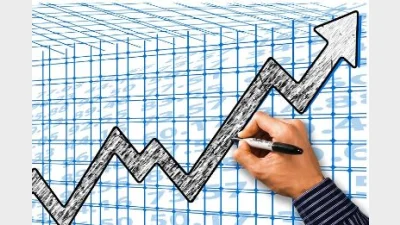Global economy remains mired in uncertainty despite US progress, says Barclays



Despite calming moves from the US administration and reassurances at the IMF and World Bank spring meetings, the global economy remains on a precarious footing, according to a new analysis by Barclays.
While recent rhetoric from the White House has hinted at de-escalation on tariffs and a renewed commitment to global institutions, Barclays has cautioned that “despite having passed peak disruption, the global economy is still far from the all clear”.
Markets found some relief last week after US President Donald Trump signalled a softer approach on Chinese tariffs and Fed chair Jerome Powell’s tenure, moves seen as steps back from the brink following a turbulent start to Trump’s second term.
Treasury Secretary Scott Bessent, speaking at the Washington meetings, also reaffirmed America’s commitment to the Bretton Woods institutions, presenting tariffs as a tool to “rebalance the world economy”.
Even so, in a note on Monday, Barclays warned that “trade negotiation outcomes remain highly uncertain, and that in and of itself is weighing heavily on the outlook”.
While a potential endgame scenario – involving a 10 per cent universal tariff on the rest of the world and a 60 per cent tariff on Chinese imports, alongside sectoral tariffs at 25 per cent – would mark a de-escalation from previous threats, Barclays cautioned it would still represent a significantly higher burden than envisaged only months ago.
“Importantly, even this apparent consensus scenario is nothing but a best guess among those attending meetings in DC this week, trying to make sense of the various messages sent by US officials and negotiating countries,” the investment bank said.
“There does not seem to be a high conviction and the 90-day negotiation period is widely seen as extremely short to negotiate trade agreements. If anything, these would more likely be letters of intent that would lead to extensions of the tariff moratorium, while agreements are finalised.”
The IMF’s unusual move to present a range of “reference scenarios” rather than a single baseline forecast also reflects the deep uncertainty gripping the global economy, Barclays further highlighted.
“The unpredictability of the process should continue to weigh on activity,” it said, cautioning that the uncertainty itself would hurt the US economy “at least as much as the rest of the world”.
“Even if the ongoing earnings seasons still show robust numbers, many companies will likely prepare to hunker down until visibility improves. This makes a recession increasingly likely,” Barclays added.
Turning to Trump’s negotiations, particularly with Japan, South Korea and India, the investment bank said that despite preliminary upbeat signals, actual progress has been limited.
“No deal has actually been reached with Japan,” Barclays said, adding that Japanese officials have expressed “grave concerns” and frustration over a lack of clarity from Washington.
Meanwhile, negotiations with China – the most consequential – remain mired in conflicting narratives.
While Trump and Bessent’s recent comments suggested tariffs could “come down substantially”, China has publicly rejected claims of ongoing talks, insisting it would not negotiate under pressure.
“Markets have welcomed the apparent US backtrack from tariffs, but the endgame remains up in the air, with much noise around the progress of bilateral negotiations likely over the coming week,” Barclays said.
Beyond trade, the geopolitical backdrop remains fraught, the investment bank said, with efforts to broker a peace deal in Ukraine having hit familiar roadblocks, despite the US brokering a partial 30-day ceasefire.
Ultimately, Barclays reiterated that the elevated uncertainty, combined with tariff headwinds, is increasing the risk of a US recession later this year.
“Although the consensus during the DC meetings was for this to be a mild US recession in H2 2025, many noted downside risk,” the bank said, particularly given that traditional economic models may underestimate the impact of today’s outsized shocks.
In the meantime, the bank expects the global economy to remain caught in the “fog of the trade war”, with corporate leaders and investors alike preparing for more turbulence ahead.
Similarly, in a note on Monday, Commonwealth Bank said it has "significantly downgrade the outlook for the global economy because of the trade war".
"We now estimate the global economy will expand by only 2.4 per cent in 2025," CBA said.
Describing the implementation of US tariff policy as "erratic", the big four bank labelled the likelihood of a recession in the US as a "real risk", and predicted a recession in Canada, alongside a stagnation in Japan and the Eurozone.
"Retaliation to US tariffs deepens the economic impacts on both the US and the retaliator," the CBA said.
"If cooler heads do not prevail in a negotiation, the US and China are on track to substantially decouple their economies.
"Decoupling is well beyond the policy of selective derisking that governments in Europe, Japan and Australia pursue."
Last week, the IMF issued a sobering assessment of the global economic landscape, dramatically revised after Trump’s 2 April announcement of sweeping tariff measures.
Referring to tariffs as centennially high, the IMF said they would lead to “a significant slowdown in global growth in the near term”.
“Under these reference forecasts, global growth will reach 2.8 per cent this year and 3 per cent next year,” Pierre-Olivier Gourinchas, economic counsellor at the IMF, said.
“Under an alternative path that excludes the April tariff announcements, global growth would have seen only a modest downgrade to 3.2 per cent this year.”
Also at the time, the IMF raised the likelihood of a US recession to some 40 per cent, up from its previous forecast of 25 per cent in October.
Recommended for you
A former adviser to superannuation trustees has sounded the alarm on what he describes as “serious deficiencies” within the system, urging regulators to take immediate action.
The International Monetary Fund (IMF) has issued a sobering assessment of the global economic landscape in its latest World Economic Outlook, dramatically revised after Donald Trump’s 2 April announcement of sweeping tariff measures.
Growth from the listed company’s key businesses has propelled Generational Development Group to new milestones in the three months to 31 March.
Sharemarkets might have been rallying on the back of central banks’ progress in the inflation fight, if not for Donald Trump’s escalating trade tensions and renewed attacks on the US Federal Reserve, according to AMP’s chief economist Shane Oliver.












